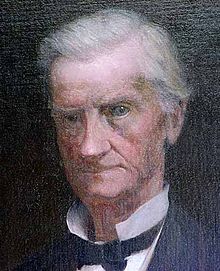George W. Clinton
George William Clinton | |
|---|---|
 Portrait of George W. Clinton | |
| 12th Mayor of Buffalo | |
| In office March 8, 1842–March 14, 1843 | |
| Preceded by | Isaac R. Harrington |
| Succeeded by | Joseph G. Masten |
| Personal details | |
| Born | April 21, 1807 New York City, New York |
| Died | September 7, 1885 (aged 78) Menands, New York |
| Political party | Democratic |
| Spouse | Laura Catherine Spencer |
| Children | Nine children |
| Residence | Buffalo, New York |
George William Clinton (1807–1885) was a New York lawyer, politician, judge, author and amateur naturalist. He served as Mayor of Buffalo, New York from 1842 to 1843.
Biography
He was born New York City on April 21, 1807. He was the son of DeWitt Clinton, grandson of James Clinton, grandnephew of George Clinton and nephew of James G. Clinton and George Clinton, Jr.. George W. Clinton grew up in Albany, New York, and attended The Albany Academy. He graduated from Hamilton College in 1825 and Norwich University in 1827, and was a member of Phi Beta Kappa. He then attended the Litchfield Law School, completed his legal studies with John Canfield Spencer, and was admitted to the bar in 1831.
Clinton initially practiced law in Albany. He moved to Canandaigua, New York in 1832 and was District Attorney of Ontario County from 1835 to 1836. On May 15, 1832 he married Laura Catherine Spencer, the daughter of John Canfield Spencer. Their children included sons George and Spencer, both attorneys in Buffalo.
He moved to Buffalo in 1836 and settled on the north side of East Mohawk Street between Washington and Ellicott Streets. The same year he organized the local Democratic Party with 20 or so other citizens.
On March 22, 1838, he was appointed collector of customs by President Martin Van Buren and he served until 1842. In March 1842, Clinton was elected Mayor of Buffalo by a nearly unanimous vote. Although a Democrat, his election was unique in that he was not a party candidate. During his term the City Charter was revised. On March 14, 1843, he presided over his last council meeting.
Clinton was appointed as United States Attorney for the Northern District of New York under President James K. Polk, and served from 1847 to 1850. From 1854 to 1878 he was Judge of Buffalo's Superior Court. His legal writings included the three volume Digest of the Decisions of the Law and Equity Courts of the State of New York. In 1856 he was appointed a Regent of the University of the State of New York. He served until his death, and attained the position of Vice Chancellor of the board.
When the Buffalo Society of Natural Sciences was founded on December 5, 1861, Clinton was one of the organizers. He was chosen its first president, and served for 20 years. He was an amateur naturalist, and published 1882's Catalogue of the Native and Naturalized Plants of the City of Buffalo and its Vicinity.
In 1864 Clinton was awarded the honorary degree of LL.D. by Hamilton College. In 1867 he was a delegate to the state constitutional convention.
In 1882 he moved to Albany to become editor of the Clinton Papers, a collection left by George Clinton. He died on September 7, 1885 while walking through Albany Rural Cemetery in Menands. He was laid to rest in Forest Lawn Cemetery, still clutching the clover he was holding when he died.
References
External links
- Through The Mayors' Eyes by Michael Rizzo (The Buffalonian, 2005, ISBN 978-1-4116-3757-3 ; pg. 424)
- George W. Clinton at Find a Grave
- George W. Clinton in Scientific Papers of Asa Gray: Essays; Biographical Sketches, 1841-1886
- Minutes of the Regents of the University, by New York State Education Department, 1860
- Report of the Regents of the University of the State of New York, Volume 66
- George W. Clinton at Norwich University, 1819-1911: Her History, Her Graduates, Her Roll of Honor, Volume 3, by William Arba Ellis
- George W. Clinton at Catalogue of the New-York Alpha of the Phi Beta Kappa, 1852
- An Address Commemorative of George W. Clinton: Delivered Before the Buffalo Historical Society, David Fisher Day, 1890
- 1807 births
- 1885 deaths
- Hamilton College (New York) alumni
- Norwich University alumni
- Litchfield Law School alumni
- New York lawyers
- New York Democrats
- Mayors of Buffalo, New York
- County district attorneys in New York
- United States Attorneys for the Northern District of New York
- New York state court judges
- American naturalists
- Burials at Forest Lawn Cemetery, Buffalo
